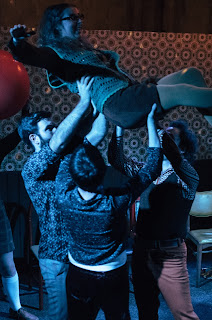Jesse Jones is the co-director of 1972: The Future of Sex which is the latest show from theatre company The Wardrobe Ensemble.
1972: The Future of Sex was born from The Wardrobe Ensemble reflecting on their own attitudes towards sex in 2015 and using the prism of their parents’ generation to explore relationships.
For The Wardrobe Ensemble, Jesse previously co-directed Edgar and The Land of Lost, devised and performed RIOT and was Associate Director on 33. Away from the company he directed Rorry Malarkey's The Grandfathers, winning National Theatre Connections 2012 and revived professionally at the NT Shed in 2013.
Jesse has worked as Staff Director at the National Theatre, assisting on Emil And The Detectives 2013/14. He is an associate artist of Bristol Old Vic Outreach and founded the Wardrobe Theatre where he directed Wildbore, Guttermouth and Scumbag. His adaptation of Sally Gardener's novel Maggot Moon is in development at the National Theatre Studio. In January 2015 he was appointed Resident Director of Royal and Derngate Theatre in Northampton as part of the Regional Theatre Young Directors’ scheme.
I recently had a quick chat with Jesse about the creation of 1972: The Future of Sex…
How was your new show, 1972: The Future of Sex, born? Where did it all begin?
When we (The Wardrobe Ensemble) first got together as a company, we were talking about lots of different ideas and one of the company talked about making a show about their virginity, but we decided it wasn’t the right time for us to make it. Then we were in the bar at the National Theatre when our show RIOT was on in the Shed and we decided we wanted to revisit that idea. We wanted to look into the relationship people in their late teens/early twenties have to sex as well as society’s relationship to sex and sexuality.
We started to think about that idea and the idea grew. One of our biggest fears was that it would just be us onstage talking about our own sexual experiences which wouldn’t work. We looked for a moment in history and a time period where things changed. We looked at the late sixties/seventies which was the end of the sexual revolution and before the AIDS epidemic. There was a lot going on at that time! It felt like a moment where things changed.

So going forward how did you put the piece together? I guess you all had to be very honest and straight talking?
Absolutely, we all talked very openly. We’ve known each other for a long time and worked together for five years so our room is a very safe environment. We already knew lots about each other. We all interviewed our parents about their sexual experiences in the seventies which was an amazing thing not just for our resource material, but for our relationships with our parents. Of course we were respectful with people’s privacy, but actually everybody who came in to speak to us was really open which was refreshing.
What can audiences expect? What will they go through?
We believe in the power of laughter because creating an environment where people can laugh is the best way into then being able to ask big questions of them and think about the work. We always try to be funny, satirical, silly and at the same time ask big questions. I think people will be entertained and hope they will come out thinking about their place in society and their relationship with sex and sexuality.
Interviewed by Andrew Tomlins (Editor)
1972: The Future of Sex runs at the Wardrobe Theatre in Bristol until 26th March before touring to Exeter, Shoreditch, Canterbury, Leeds, Manchester, Bracknell, Brighton and Plymouth.
Photo Credit: Jack Offord


No comments:
Post a Comment